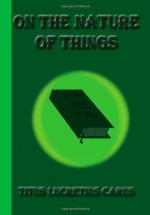|
This section contains 511 words (approx. 2 pages at 400 words per page) |

|
Epic Features
De rerum natura is a very unusual example of an epic. It lacks many of the epic's typical features, including an expansive setting, a heroic and adventurous figure, and praise for the gods. Still, the language is lofty and lyrical, and Lucretius often utilizes analogies and metaphors to convey his ideas. While he makes frequent allusions to the works of other philosophers, he generally does so to refute their positions rather than to align his work with theirs, as most epics do.
Audience
Lucretius claims that his audience is Memmius, the person to whom the epic is dedicated and addressed. In reality, however, the work is written for those who falsely believe in divine intervention and fear death. In short, his audience is his contemporaries and others who would come after him. His intention was to enlighten his readers in order to free them from a life...
|
This section contains 511 words (approx. 2 pages at 400 words per page) |

|




